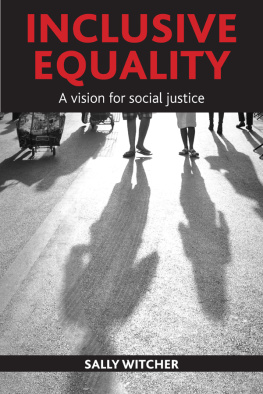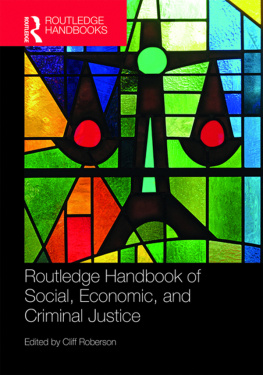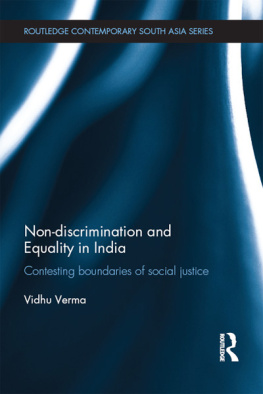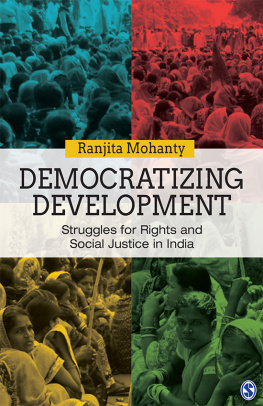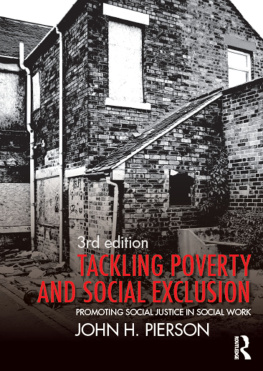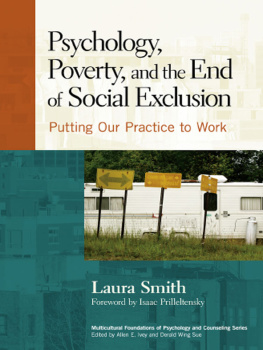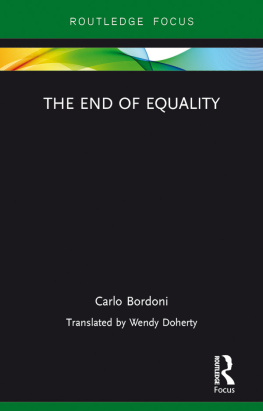First published in Great Britain in 2013 by
Policy Press University of Bristol 6th Floor Howard House Queens Avenue Clifton Bristol BS8 1SD UK Tel +44 (0)117 331 5020 Fax +44 (0)117 331 5367 e-mail
North American office: Policy Press c/o The University of Chicago Press 1427 East 60th Street Chicago, IL 60637, USA t: +1 773 702 7700 f: +1 773-702-9756 e:
Policy Press 2013
British Library Cataloguing in Publication Data
A catalogue record for this book is available from the British Library.
Library of Congress Cataloging-in-Publication Data
A catalog record for this book has been requested.
ISBN 9781447320531 ePUB
ISBN 9781447312659 Kindle
The right of Sally Witcher to be identified as author of this work has been asserted by her in accordance with the Copyright, Designs and Patents Act 1988.
All rights reserved: no part of this publication may be reproduced, stored in a retrieval system, or transmitted in any form or by any means, electronic, mechanical, photocopying, recording, or otherwise without the prior permission of Policy Press.
The statements and opinions contained within this publication are solely those of the author and not of the University of Bristol or Policy Press. The University of Bristol and Policy Press disclaim responsibility for any injury to persons or property resulting from any material published in this publication.
Policy Press works to counter discrimination on grounds of gender, race, disability, age and sexuality.
Cover design by Policy Press
Front cover: image kindly supplied by www.alamy.com
Readers Guide
This book has been optimised for PDA. Tables may have been presented to accommodate this devices limitations.
Image presentation is limited by this devices limitations.
Preface
Before launching into the book I hope it is helpful to provide an indication of what you are going to find and what you will not. First, although it is an academic study, in some ways it is not typical of such works, any more than I am a typical academic. It is primarily an exploration of ideas, theories, discourses and concepts (although occasional use is made of empirical data, particularly when setting the context in the introduction). Whether the end result amounts to anything as sophisticated as social theory is another matter.
Second, the book is perhaps unusual in that its focus is upwards and outwards, in an attempt to create a vision of the bigger picture, rather than on burrowing down into microscopic exploration of any one of its features. While it draws heavily on a wide variety of academic work, it makes no claims to coming anywhere close to a comprehensive literature review. Given the range of ground covered, such an exercise would run to numerous volumes. In my hunt for raw material with which to build an overarching framework, I have roamed across topics and disciplines. While I hope the resulting edifice stands up to general scrutiny, some parts of it are more robust than others. For example, I know that there is a lot more that could be said (and has already been said by others) about socio-economic class, network theory, identity and the literature on participative democracy. The sociology greats, in fact sociology in general, do not get the attention they deserve.
I may have discovered rather too late in the day why microscopic burrowing is generally preferred! Not only has the enormity of the task sometimes felt overwhelming, it is fraught with dangers. I may have spent most of my working life exploring the fields of poverty, inequality and social exclusion, but I cannot and certainly do not claim to be expert in everything to do with them. The bigger the picture, the more likely it is that limitations will be exposed. I am acutely aware that I am boldly going, not just where others have gone before, but into well-trodden terrain on which eminent academics have built life-long careers, founded on in-depth study of any one of the many areas touched upon within these pages. There are, therefore, a lot of people who will be extremely well placed to point out all the books weaknesses and all the important authors and angles I have undoubtedly missed. I realise that I may well have unwittingly ridden roughshod across sensitive intellectual territory, trampling carefully honed, nuanced argument in my wake. If so, I can only apologise and promise to learn from my mistakes.
Yet I hope that there is some merit in this foolhardy mission, even if it is just to show what other perspectives might have to offer. It may be that concepts can only really be grasped in terms of how they are positioned in conjunction with each other. Perhaps the resulting arrangement could tell us more than any one of them in isolation about the nature of disadvantage and how it operates. This reminds me of the fable (which a quick consultation of Wikipedia reveals to feature in a variety of religions) about people who cannot see, each holding a different part of an elephant, who separately understand elephant very differently but who collectively can build up a picture of the whole beast.
Like most peoples literary endeavours at some level, this one was prompted by experiences in my professional and personal life. This book has been informed by a number of perspectives that I have largely acquired through an (in all other senses) erratic career-path. I have explored its subject-matter from the angle of campaigner, academic, civil servant and disabled person. I mention the last with some trepidation, not because I am at all uncomfortable with that aspect of my identity, but because I know to my cost that it can distort the expectations of even fair-minded, honourable people. Indeed, the expectation may now be that this book is all about disability. It does make an appearance, along with much else, in the context of the more widely experienced phenomenon of misrecognition.
As the director of the Child Poverty Action Group, I found myself inextricably immersed in endless debates about the meaning of poverty and its measurement. Yet, while each form of measurement had its strengths and weaknesses, it was, of course, perfectly clear to everyone that the picture they collectively painted amounted to clear evidence of the existence of poverty, its extent and its devastating consequences. Much energy was expended in attempting to nail jelly-like meaning to the wall; to make the case for government action to tackle poverty to a government that refused to acknowledge that poverty existed in Britain. Absurdly, to stand any hope of engaging them, the word poverty had to be banished from all submissions, and replaced with financial hardship, which, for some reason, was deemed more palatable.
When I later went back to university, I discovered how meaning can also fall down the gaps between disciplines. Confusingly, concepts can be reinvented and renamed by people working in separate academic silos. A brief stint in the civil service revealed analogous phenomena. In spite of the mantra of joined-up government, the imperative is often unavoidably to focus down onto the particular policy issue and priorities of the Minister in question, regardless of their wider interface contemporaneously, with what went before or with what might come next.
In whatever setting, regardless of the skills and the good intentions of those concerned, there are dynamics that militate against a holistic approach. The power of institutional culture and systems to drive behaviour is very considerable. Complexity, rapid change and just sheer overwhelming scale create a bewildering spectacle that is more than enough to prompt anyone to avert their gaze onto more immediate, familiar, comprehensible surroundings. Furthermore, no matter how hard we look there are some things that are difficult to see. Experience tells me how valuable it can be to generate dialogue between different stakeholder groups. What a problem looks like from one perspective can bear no resemblance to how it looks from another. Similarly, what appears to be an obvious solution to one party can, to another, be unworkable or just completely misses the point.

